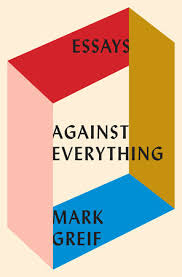What does gym culture say about our tendency toward masochism? What does the media frenzy around “Octomom” Nadya Suleman say about the 2008 subprime mortgage crisis? What do the strange fashions and angry, incomprehensible lyrics of punk rock have to say about anything at all?
These are some of the questions posed by n+1 co-founder Mark Greif’s Against Everything, a collection of essays as broad in scope as its title suggests, though not nearly as reproachful. In fact, what’s most surprising about these learned, genial, often brilliant pieces, in the context of the clickbait cultural criticism that has spread like SoulCycle studios since n+1 was launched in the mid-aughts, is just how many things Greif is unabashedly for. Individualism, ‘genius’, and Thoreau are all kosher. Pop music is good. Rap is great. Epicureanism (in its classical sense) and romantic love are met with approval. Even the police have their virtues, so long as they stick to their proper function (they ought to act more like traffic cones and less like paramilitary death squads, in Greif’s eminently reasonable view).
In the book’s preface, Greif explains his title as a philosophical technique: to push up against everything and see if it will remain standing. But I found it instructive to learn, in a podcast interview with the author, that he chose Against Everything also as a kind of parody. That is, he had in mind “the sorts of titles that appear in articles on the internet now, and even in a range of books . . . . marketed to dog-lovers called Against Dogs, marketed to cat-lovers called Against Cats . . . just to try to get people’s goats. Why not accelerate this . . . and go all the way: Against Everything. What else do we have?”
The title might also be taken as a comic overstatement of the critical theorist’s job description: Here is that ruthless criticism of all that exists we’ve been waiting for, and it turns out that all that exists doesn’t pass muster. Yet Greif is highly aware of the limits of supposedly dispassionate critique. He does not make his pronouncements from on high. He does not try to shame us. He does not ignore his own relationship with the subject matter. These essays convey, as Greif puts it in the interview, a “post-theoretical turn towards a renewed attention to the individual self and the inner world.” As it’s that renewed interest in the self that leads Greif back into the world.
Many of the pieces in this book are indeed against things: They are deconstructions (or, if you like, take-downs) of the ideologies that hold us in thrall today: exercise as body regulation, the desperate capitalist association of sex and youth, foodie-ism, and other low-hanging fruits of our alienated labor. But other essays — the ones subtitled “The Meaning of Life” — offer not only a critique but a way forward. What makes so much mediocre cultural criticism feel empty is a sense that the author’s imaginative capability begins and ends with negation. Greif, however, hopes to build over the rubble of what he has razed. This is a more difficult task than mere demolition. In doing so Greif runs the risk of being called either a pie-in-the-sky dreamer (as when he calls for a $100,000 hard cap on salaries) or of aping the ideals of those whom he means to overthrow (as when he commends the more-or-less solipsistic philosophy of Epicurus). In short, he risks internal contradictions. And it is Greif’s willingness to court his own ambivalences and inconsistencies that make these essays both enjoyable and genuinely edifying.
It seems to me the linchpin to Greif’s method of ambivalence is contained in the first of these “The Meaning of Life” essays, called “The Concept of Experience.” The first half of the piece is a kind of polemic against the contemporary compulsion for attaining and curating experiences, an experience, in this case, being defined as that “which gives us the feeling we are really living, but makes us unsatisfied with whatever life we attain.” Sex, alcohol, and travel all exemplify the concept of experience: Each provides us something to look forward to or remember without providing a way to be.
Against this faulty and self-defeating path, Greif suggests two alternatives: aestheticism (e.g., the filtering of all experience through the alembic of artistic observation into fascinating or beautiful phenomena, as practiced by Flaubert) and perfectionism (i.e. the philosophical tradition inaugurated by Aristotle when he suggested man’s purpose in life is the cultivation of his own rationality, and made modern by Thoreau when he went into the woods to see what they had to teach him about how to live). Aestheticism “asks you to view every object as you would a work of art. . . . [t]o feel or taste everything; [to] lust for it, let it overwhelm you, amplify it to titillate or satisfy or disgust you.” Perfectionism “charges the self with weighing and choosing every behavior and aspect of its way of living. . . . The process of weighing . . . becomes the form of experience.”
This seems straightforward enough, but eventually it becomes clear just how porous the line is between the practices Greif advocates and those he derides. Generally speaking, each of the practices Greif is against begins to look like aestheticism or perfectionism, but in a form somehow perverted or misapplied. Thus the lionization of punk and other subcultures is a kind of false perfectionism, indicating a scrupulous self-fashioning and worthy desire for “deep meaning and joint experience,” but misdirected away from political engagement. Thus reality television, in “The Reality of Reality Television,” works as a kind of false aestheticism, whereby the minutiae of the Kardashians’ lives are indeed turned into art, but the effect is rather to tranquilize than to wake oneself up to life.
And sometimes the problem with the aestheticism or perfectionism in question is that the one bleeds into the other. “Octomom and the Market in Babies,” perhaps the best essay in book, looks at first like a simple case in twisted perfectionism. Here is a woman who has asked the question of how she ought to live and found a definitive, resonant answer within her own womb. We see Nadya Suleman, entrepreneurial matriarch, inspired by the example of her own fetuses, spending public assistance granted for the care of six children on the in vitro fertilization treatments that allowed her to give birth to octuplets. The circumstances of the miracle eight-child birth, Greif explains, were even stranger than they first seemed. Suleman’s doctor “supposedly informed her that multiple extra embryos created for her earlier IVF treatments were going to be thawed and disposed of. As she explained to television viewers later: ‘Because they’re frozen doesn’t mean they’re not alive. And they’re still — they are alive. They’re human lives!’”
But the real story, for Greif, is not Suleman’s motives but the media frenzy that followed, and its coincidence with the 2008 financial crisis. His argument is worth quoting at length:
To summarize in the language we were all then coming to learn: Nadya had leveraged her disability payments into six babies, collateralized them (as a state liability likely to pay revenues for years to come), and then quite brilliantly leveraged those six babies into eight more.
When Wall Street had done this — tried to wring profit out of bad risk by climbing deeper into the hole — the taxpayer money doled out to rescue their misbegotten investments was called a much-needed “bailout.” On Fox News and MSNBC, Nadya Suleman was called assorted names.
. . . The true lesson, as the official news sources made it out, was that here, before our eyes, in Nadya Suleman, we had the essence of the faceless ones who caused the crisis: the buyer of the five-thousand-square-foot home his family couldn’t afford, the taker of the $500,000 mortgage on $50,000 salary with no down payment (and perhaps a variable rate), now gambling with human life. Here was the new expanding lower middle class that didn’t save, but felt “entitled”; who inflated the bubble economy; who had tempted and motivated the poor financiers who traded those mortgages bundled into collateralized debt obligations and written each other unfulfillable insurance against their default, and threatened to blow up everything unless the government, taking over failing banks, paid up. It helped that she was a “she,” the evil female consumer. Octomom was the fat spider at the center of a hanging web. Squash her!
The scapegoating process which Greif details with such precision (and which has been posited as a general principle common to all societies by the philosopher René Girard) is, in a way, a kind of badly aimed aestheticization. Which is to say: the story behind the subprime mortgage crisis is too complex, contains too few obvious villains and requires too much insight into one’s own complicity with a corrupt system, so that a drama is invented to focus a society’s pain and rage into something articulable. And this drama is so effective at channeling emotion that it is eventually taken, for the sake of convenience, to be fact. Whereas we should have been looking soberly at the political foundations of our society, we were busy telling ourselves stories in order to live
If, in the above case, we have art so as not to perish from the truth, in “Anaesthetic Ideology” Greif takes on those who may have too much truth so as not to die from art. The depressive, the stoner, the drunk, and the vague Buddhist are held up as contemporary exemplars of the anaesthetic ideology, i.e. “the desperate wish for anti-experience.” This ideology comes in response to the fact that we’re over-saturated in our daily lives with the drama of 24-hour news, endless television, proliferating screens. And not only that, but now all forms of drama have become indistinguishable. “[T]he police drama in which a criminal is shot,” Greif writes, “the hospital drama in which the doctors massage a heart back to life, the news video in which jihadists behead a hostage, and the human-interest story of a child who gets his fondest wish (a tourist trip somewhere) become the same sorts of drama.”
The situation is grim, and Greif relays with approval the doctrine of the classic philosopher Epictetus, who saw tragic drama as, in effect, a waste of time. (“For what else is tragedy but a portrayal in tragic verse of the sufferings of men who have devoted their admiration to external things?”). Yet Greif senses that we do need some fiction in our lives; he isn’t quite ready to ban it from the republic for the sake of morale. “There is also a dream of an alternative aesthetic,” he writes in the essay’s conclusion, “of a world in which aestheticized experience worked only on things that were ordinary, local, small, repetitive, and recalcitrant, on things that really did happen to most of us in the everyday.” This plea for ultra-kitchen sink realism bleeds into the confounding questions: Would a drama that so resembled life as to become it still be a drama, or something else? Is there even such a thing as unadulterated “life” — a pure existence unmediated by the tendency to dramatize and make meaning? Greif leaves these questions unanswered.
Greif argues in turns, passionately and persuasively, for the utility of both perfectionism and aestheticism. They are both correctives to the ideology of collecting far-flung experiences, because both make every moment of life feel vital. They both demand of the self real vigilance. They both can last a person a lifetime.
The fact is, it seems to me, that the two projects are also incompatible with one another. To aestheticize is to remain aloof from the world, to look at it always dispassionately, isolate oneself. (At least that’s what Greif’s exemplar Flaubert did.) To practice perfectionism, on the other hand, is to have skin in the game. The practitioner is invited constantly to change himself for the better. It is an ultimately moral way of being in the world. And it is a way that would seem to lead to an active role in the lives of others, which is to say, a life of politics.
Greif’s refusal to privilege one of these projects above the other gives these essays, read as a whole, an exciting, sometimes frustrating, internal tension. William Butler Yeats, in a much-quoted poem, mused that “[t]he intellect of man is forced to choose / perfection of the life, or of the work.” It’s Greif’s desire to have both that prevents him from ever coming out wholeheartedly for either.
***
It is in the spirit of Against Everything that it should be reviewed not only as a collection of words between covers, but an object in culture. To wit: It got a prominent place in the New York Times Book Review; it was reviewed favorably in centrist arenas as Tablet and Slate; the elegance of its flat-design jacket cover would make even the zeitgeistiest web developer jealous; and, unlike most other books advocating a universal basic income and Occupy’s radical democracy, it comes bearing a blurb from Zadie Smith. Which is all to say, the book has done very well for itself. Or at least it has got past the gatekeepers.
No doubt this in part due to the cultural capital that n+1 has built up over the years, and in part simply because Greif writes so well. But I think it may also be that, over the course of the decade’s worth of philosophizing that this collection represents, Greif has honed a particularly effective method of getting anti-capitalist thought past the censorship of recalcitrant minds. In his essay on income inequality, “Gut-Level Distribution,” Greif states that “the purpose of life is to free individuals for individualism,” and that both the rich and the poor are denied this by the demands of work. He continues: “[m]oney inequality creates a single system that marks every person and places him above or beneath another . . . . These so called individuals will then be led, by the common standard of the dollar, to common interests, common desires, and little that’s individual at all.” The fact of stifled individualism may be a less pressing result of capital than the wage slavery of millions, but it does have its merits, and it may be a more politically effective argument among those with power and resources. And in the era of America’s first combination reality star-real estate tycoon-president, the fact of capitalist culture’s weird, suffocating homogeneity is well-positioned for a take-down.
And it may be that a circumspect, undogmatic anti-capitalist thought is well-positioned for ascendance. In any case, Against Everything, with its ambivalence and its generosity, its sympathy with both ethical and aesthetic aims, signals a sort of leftism that even the most unbudging centrist might come to be moved by. Any good leftist knows that our supposed liberal democracy is a sham; what distinguishes Grief is that he really is interested in both liberality and democracy. He doesn’t claim to know what the perfect social system is, but he knows it must be considered with care and humility. From Marx and the critical theorists, Greif has learned that in order to preserve the best of something, one must go beyond it. That beyond is something he’s ready to think through for himself. Are we?
Noah Kumin is a writer who lives in New York City.
This post may contain affiliate links.








